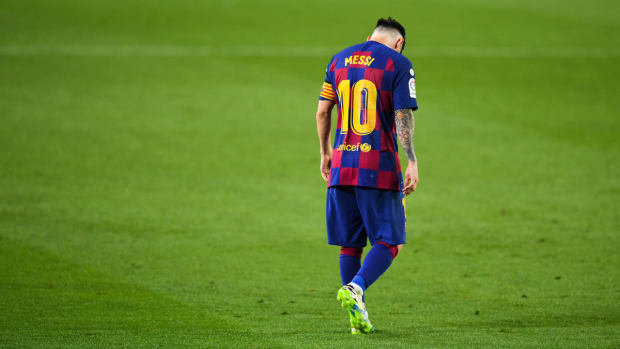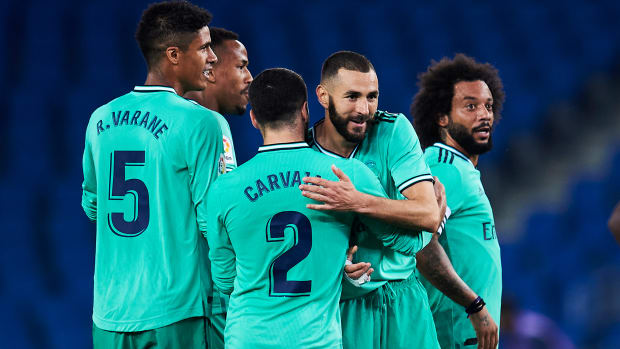Barcelona's cracks are becoming more apparent, and more dropped points puts Real Madrid firmly in the driver's seat.
Real Madrid’s lead over Barcelona is only a single point–though it does have a game in hand and holds the advantage in the head-to-head tiebreaker–but all the indications on Tuesday were that La Liga’s race is over. Barcelona left Camp Nou after the 2-2 draw against Atletico Madrid with the air of a defeated side. It has drawn three of its last four games to hand the clear edge to Real Madrid, and nothing in its recent form suggests it is not likely to drop further points in the six games it has remaining.
To blame the coach, Quique Setien, feels a little unfair, but that is what many are doing. After the weekend draw at Celta Vigo–the 10th time this season Barcelona has dropped points on the road–Luis Suarez was asked what had gone wrong with the club's away form. His reply was blunt: “I think that’s why the coaches are here, to analyze those situations.” But Setien is barely there. After early team talks that were essentially praises to the genius of Lionel Messi, he has begun to get his assistant, Eder Sarabia, to conduct them.
Sarabia, who has worked with Setien since his time at Las Palmas, is younger and is seen as an enforcer for the undemonstrative Setien, but players have reportedly been angered by his touchline demeanor. During the Clasico at the beginning of March, Sarabia was pictured sitting in the dugout in open despair at Barcelona’s performance as it lost 2-0, and as his frustration has remained unabated, he has become a lightning rod for discontent. Setien’s substitutions against Celta Vigo, taking off Suarez from the
out-of-sorts Antoine Griezmann with 10 minutes to go and removing Riqui Puig for Juventus-bound Arthur after 86 minutes, led to a dressing-room confrontation. Tuesday, with Barcelona needing a late goal, he left Griezmann rooted to the bench until the 90th minute and offered a scathing postgame quote, saying, "It's difficult to put him on without destabilizing the team."
But Setien is a symptom not a cause. Although the Barcelona board continues to insist he was its first choice, nobody is in any doubt he was–at best–third, behind Xavi and Ronald Koeman. It will not have escaped anybody’s notice either that Barcelona was top of the league when he was appointed. It wasn’t playing particularly well, and there was little sense that its position was unassailable, but still, it has clearly gotten worse since. Getting rid of Ernesto Valverde, who had won league titles in the only two season he had completed, may have been understandable, given how league titles have been devalued in Spain of late, but to oust him without a clear plan of succession was inexcusable. Barcelona is reaping that harvest now.
The ongoing farce in the Spanish application of VAR, so that anything resembling contact in the box is now given as a penalty, offered some distraction on Tuesday, but not enough. This wasn’t a one-off. It was another manifestation of the same issues that have plagued the club for years. That Barcelona has been so successful domestically despite that is a shameful indictment both of the financial structure of the Spanish league by which only two teams really can compete, and of Real Madrid. Zinedine Zidane should lead Real to another league title this season, but let nobody think this is a glorious success. It’s more a case that Barcelona has finally reached a point at which it is run even more chaotically.

But then Valverde’s struggles were arguably the result of the shambolic way in which Barcelona has been run, the huge amounts of money spent on players who have failed to live up to expectations with the result that the same small group of players still has to carry the team. That is problematic not just because they are aging, but because of the dressing-room dynamic it creates. New players find it hard to break in, while new managers are rapidly ostracized. Since Pep Guardiola left in 2012, the only manager who has really projected much of a sense of authority was Luis Enrique, and even he came close to the exit in January 2015–four months before he led Barcelona to its most recent Champions League title.
All sides facing Barcelona now know that the midfield is prone to becoming stretched. Any side that can counterattack quickly has a chance against it. The Champions League has been effectively a game of pass-the-parcel for the superclubs for some time now, which means European success remains possible, but it’s hard to believe that Barcelona’s susceptibility to aggressive sides with runners through midfield won’t count against it in the quarterfinal, even if it does come through its last-16 tie against Napoli that is currently at 1-1 on aggregate.
The positives are the emergence of the 20-year-old Puig and 17-year-old Ansu Fati. But the far bigger question is the environment into which they are being introduced and the increasing sense that Barcelona, at the moment, is essentially unmanageable.
Barcelona's cracks are becoming more apparent, and more dropped points puts Real Madrid firmly in the driver's seat.
Real Madrid’s lead over Barcelona is only a single point–though it does have a game in hand and holds the advantage in the head-to-head tiebreaker–but all the indications on Tuesday were that La Liga’s race is over. Barcelona left Camp Nou after the 2-2 draw against Atletico Madrid with the air of a defeated side. It has drawn three of its last four games to hand the clear edge to Real Madrid, and nothing in its recent form suggests it is not likely to drop further points in the six games it has remaining.
To blame the coach, Quique Setien, feels a little unfair, but that is what many are doing. After the weekend draw at Celta Vigo–the 10th time this season Barcelona has dropped points on the road–Luis Suarez was asked what had gone wrong with the club's away form. His reply was blunt: “I think that’s why the coaches are here, to analyze those situations.” But Setien is barely there. After early team talks that were essentially praises to the genius of Lionel Messi, he has begun to get his assistant, Eder Sarabia, to conduct them.
Sarabia, who has worked with Setien since his time at Las Palmas, is younger and is seen as an enforcer for the undemonstrative Setien, but players have reportedly been angered by his touchline demeanor. During the Clasico at the beginning of March, Sarabia was pictured sitting in the dugout in open despair at Barcelona’s performance as it lost 2-0, and as his frustration has remained unabated, he has become a lightning rod for discontent. Setien’s substitutions against Celta Vigo, taking off Suarez from the out-of-sorts Antoine Griezmann with 10 minutes to go and removing Riqui Puig for Juventus-bound Arthur after 86 minutes, led to a dressing-room confrontation. Tuesday, with Barcelona needing a late goal, he left Griezmann rooted to the bench until the 90th minute and offered a scathing postgame quote, saying, "It's difficult to put him on without destabilizing the team."

But Setien is a symptom not a cause. Although the Barcelona board continues to insist he was its first choice, nobody is in any doubt he was–at best–third, behind Xavi and Ronald Koeman. It will not have escaped anybody’s notice either that Barcelona was top of the league when he was appointed. It wasn’t playing particularly well, and there was little sense that its position was unassailable, but still, it has clearly gotten worse since. Getting rid of Ernesto Valverde, who had won league titles in the only two season he had completed, may have been understandable, given how league titles have been devalued in Spain of late, but to oust him without a clear plan of succession was inexcusable. Barcelona is reaping that harvest now.
The ongoing farce in the Spanish application of VAR, so that anything resembling contact in the box is now given as a penalty, offered some distraction on Tuesday, but not enough. This wasn’t a one-off. It was another manifestation of the same issues that have plagued the club for years. That Barcelona has been so successful domestically despite that is a shameful indictment both of the financial structure of the Spanish league by which only two teams really can compete, and of Real Madrid. Zinedine Zidane should lead Real to another league title this season, but let nobody think this is a glorious success. It’s more a case that Barcelona has finally reached a point at which it is run even more chaotically.

But then Valverde’s struggles were arguably the result of the shambolic way in which Barcelona has been run, the huge amounts of money spent on players who have failed to live up to expectations with the result that the same small group of players still has to carry the team. That is problematic not just because they are aging, but because of the dressing-room dynamic it creates. New players find it hard to break in, while new managers are rapidly ostracized. Since Pep Guardiola left in 2012, the only manager who has really projected much of a sense of authority was Luis Enrique, and even he came close to the exit in January 2015–four months before he led Barcelona to its most recent Champions League title.
All sides facing Barcelona now know that the midfield is prone to becoming stretched. Any side that can counterattack quickly has a chance against it. The Champions League has been effectively a game of pass-the-parcel for the superclubs for some time now, which means European success remains possible, but it’s hard to believe that Barcelona’s susceptibility to aggressive sides with runners through midfield won’t count against it in the quarterfinal, even if it does come through its last-16 tie against Napoli that is currently at 1-1 on aggregate.
The positives are the emergence of the 20-year-old Puig and 17-year-old Ansu Fati. But the far bigger question is the environment into which they are being introduced and the increasing sense that Barcelona, at the moment, is essentially unmanageable.



0 Comments